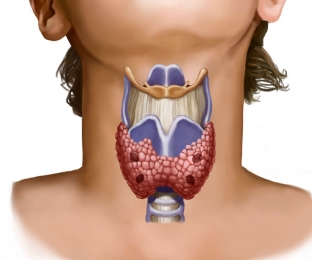Thyroid cancer refers to tumors, the occurrence of which provokes damage or structural changes in the cells of the gland. As you know, thyroid tumors are either benign or malignant. Most often, malignant tumors of the thyroid gland are detected in women living in regions prone to radiation exposure, and with insufficient use of iodine-containing foods. Despite the relative non-aggressiveness of this type of cancer, it is important to diagnose it in time and start treatment.
Thyroid tumors: causes of neoplasms
Malignant thyroid tumors (for details see doctop.ru) are often not detected in a timely manner due to the absence of severe symptoms in the early stages. The reasons why this type of cancer develops are not exactly known, but it is believed that the most common of them are:
- radioactive exposure;
- radiotherapy of the neck and head;
- insufficient dietary iodine intake;
- age and gender (although not a determining factor, there is an increased risk of thyroid tumors after age 40, especially in women);
- genetic factor;
- specialities of professional occupations (for example, work with ionizing radiation);
- bad habits and stress.
All of the above factors significantly increase the risk of malignant tumors in the thyroid gland, therefore, people exposed to such factors are strongly advised to undergo regular examinations by an endocrinologist.

Types and symptoms of thyroid tumors
Thyroid cancer can manifest itself in various forms, which are:
- papillary (most common – in 76% of cases);
- follicular;
- medullary;
- undifferentiated and anaplastic.
The main symptom of a malignant thyroid tumor is the presence of a painless nodule.
Due to the superficial location of the thyroid gland, it is not difficult to notice the appearance of a single nodule on this gland. If such a neoplasm appears, you should consult a doctor, but you should not panic in advance – in only 5% of cases it can be a malignant tumor.
If, in addition to the appearance of a nodule on the thyroid gland, you notice a thickening of the cervical lymph node, you should not postpone contacting a specialist – in some cases, these two symptoms are the only warning signs of early-stage cancer.
As for the later stages, they may be accompanied by the appearance of:
- pain in the neck (including radiating to the ear);
- difficulty swallowing;
- unreasonable hoarseness of voice;
- "lump in throat";
- unreasonable cough;
- shortness of breath;
- swelling of the veins in the neck;
- Difficulty breathing.
To make an accurate diagnosis when nodules are found in the thyroid gland, the doctor uses:
- ultrasound (to determine the location and size of the nodule);
- thyroid biopsy (only this method allows you to determine the nature of the neoplasm);
- blood test for tumor markers.
Accordingly, self-diagnosis by the patient is completely excluded.
What is the treatment for thyroid cancer?
Determination of the method of influencing the thyroid tumor is carried out after familiarization with the results of the histological examination.
The type and stage of the disease are decisive when choosing a method of therapy, namely:
- operational deletion;
- exposure to radioactive iodine;
- radiotherapy;
- hormone therapy;
- selective therapy.

The above information allows us to conclude that self-palpation of the thyroid gland and regular examinations by an endocrinologist can detect a thyroid tumor and determine whether it is malignant. In this case, the timeliness of detection and treatment – determining factor in patient survival.






Add a comment